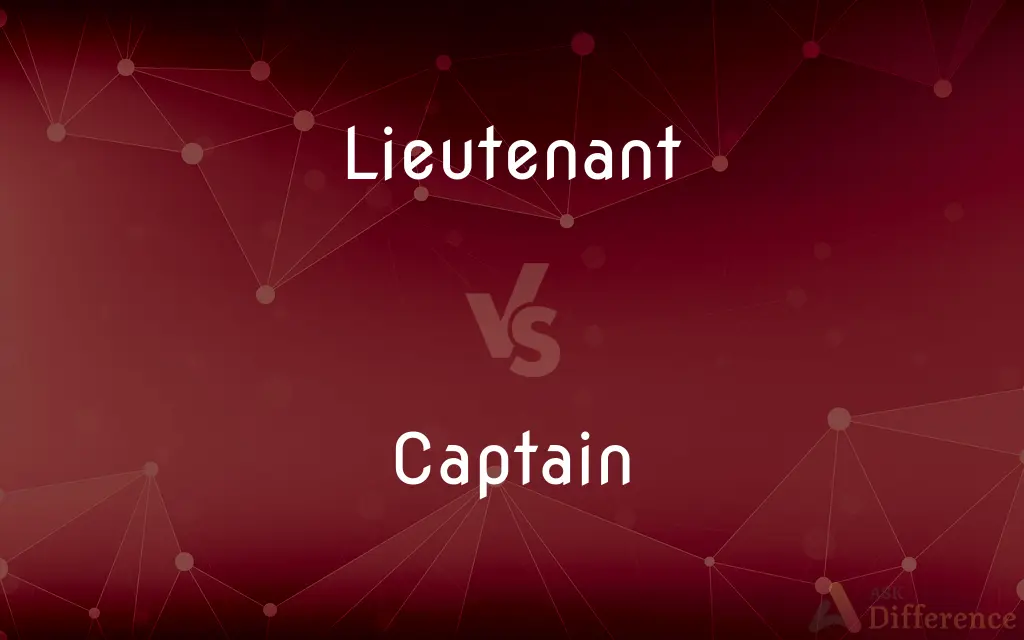Lieutenant vs. Captain — What's the Difference?
By Fiza Rafique & Maham Liaqat — Updated on March 5, 2024
A lieutenant is a junior officer in the military or police, typically ranking below a captain and responsible for leading smaller units. Captains rank higher, leading larger units or ships, and hold more authority.

Difference Between Lieutenant and Captain
Table of Contents
ADVERTISEMENT
Key Differences
A lieutenant often serves as a second-in-command within smaller military or police units, focusing on operational details and assisting a unit commander. On the other hand, a captain holds a more senior position, commanding entire companies in the military or ships at sea, and is responsible for strategic planning and decision-making.
Lieutenants are tasked with leading platoons or similar-sized units and are deeply involved in the day-to-day management of their personnel. Captains, whereas, oversee larger formations like companies or ships, focusing on higher-level operational and logistical challenges.
When it comes to the hierarchy, lieutenants fall below captains, making them less senior in the chain of command. This hierarchical difference means that, while a lieutenant may report to a captain, the reverse is not true, emphasizing the greater authority and responsibility captains hold.
The path to becoming a lieutenant typically involves completing officer training programs and starting one's military or police career as a commissioned officer. Captains, on the other hand, have usually served as lieutenants for several years, gaining experience and demonstrating leadership before being promoted.
Regarding influence and decision-making, lieutenants often have more direct interaction with enlisted personnel and are crucial in implementing orders and maintaining discipline within their units. Captains, while still interacting with their subordinates, operate at a strategic level, making decisions that affect the entire unit or ship they command.
ADVERTISEMENT
Comparison Chart
Rank
Junior officer, below captain
Senior officer, above lieutenant
Unit Size
Commands platoons or similar-sized units
Commands companies, ships, or larger units
Responsibilities
Operational details, day-to-day management of personnel
Strategic planning, higher-level operational decisions
Hierarchical Position
Reports to higher-ranking officers, including captains
Commands lieutenants and other junior officers
Experience and Promotion
Begins career as a commissioned officer, promoted from lower ranks
Promoted after years of service as a lieutenant, demonstrating leadership
Compare with Definitions
Lieutenant
A police rank below captain. responsible for supervising officers.
The lieutenant coordinated the crime scene investigation.
Captain
A title for someone in charge of an aircraft.
The captain announced our descent into London.
Lieutenant
A junior military officer ranking below a captain.
The lieutenant led his platoon through the training exercise.
Captain
A police rank above lieutenant. overseeing departments or divisions.
The captain announced new community policing initiatives.
Lieutenant
A title for a junior officer in many fire departments.
The lieutenant directed the firefighting efforts.
Captain
A military officer ranking above a lieutenant. commanding a company or ship.
The captain gave the order to advance.
Lieutenant
In the navy. a rank above lieutenant junior grade. involved in various operational duties.
The lieutenant oversaw the navigation of the ship.
Captain
The leader of a sports team.
The captain led the team to victory in the championship.
Lieutenant
An assistant or deputy in various contexts.
He served as the lieutenant to the company's CEO.
Captain
In naval terms. a rank commanding a ship or holding significant staff positions.
The captain navigated the vessel through the storm.
Lieutenant
An officer in a police force
Captain
The officer in command of a ship, aircraft, or spacecraft.
Lieutenant
A lieutenant (UK: lef-TEN-ənt or US: loo-TEN-ənt abbreviated Lt., Lt, LT, Lieut and similar) is a junior commissioned officer in the armed forces, fire services, police and other organizations of many nations. The meaning of lieutenant differs in different militaries (see comparative military ranks), but is often subdivided into senior (first lieutenant) and junior (second lieutenant and even third lieutenant) ranks.
Captain
A precinct commander in a police or fire department, usually ranking above a lieutenant and below a chief.
Lieutenant
A deputy or substitute acting for a superior
One of the Prime Minister's most trusted lieutenants
Captain
One who holds this rank or a similar rank in another military organization.
Lieutenant
One who holds any of these ranks or a similar rank in another military organization.
Captain
An officer holding a rank below a major but above a lieutenant
Lieutenant
An officer in a police or fire department ranking below a captain.
Lieutenant
A commissioned officer in the army, next below a captain.
Lieutenant
An officer holding a commissioned rank in the United States Navy or the United States Coast Guard; below lieutenant commander and above lieutenant junior grade
Common Curiosities
What is the main difference between a lieutenant and a captain?
A lieutenant is a junior officer below the rank of captain, typically leading smaller units, while a captain is a senior officer commanding larger units or ships.
How does one become a captain after being a lieutenant?
Promotion from lieutenant to captain requires several years of service, leadership skills, and sometimes additional training or qualifications.
Are lieutenants involved in strategic decision-making?
Lieutenants primarily focus on operational and tactical decisions within their units, whereas strategic decisions are more often the purview of captains and higher-ranking officers.
Do lieutenants have any authority over captains?
No, lieutenants do not have authority over captains; the hierarchy places captains above lieutenants.
How long does it typically take to be promoted from lieutenant to captain?
The time varies by service branch and individual performance but usually involves several years of experience and demonstrated leadership ability.
Can a lieutenant command a ship?
No, commanding a ship is generally the responsibility of a captain or higher-ranking naval officer.
Do captains report to anyone?
Yes, captains report to higher-ranking officers, such as majors or colonels in the military, or higher police leadership.
What is the significance of the captain's role on a ship?
The captain is the highest authority on a ship, responsible for its safe navigation, crew management, and adherence to maritime laws.
What are the responsibilities of a lieutenant in the police force?
In the police force, lieutenants supervise officers, manage day-to-day operations, and are involved in planning and administrative tasks.
What kind of ships can a captain command?
Captains can command a wide range of ships, from naval vessels to commercial ships, depending on their experience and the context.
Are captains directly involved in training new officers?
Captains may be involved in training new officers, especially in terms of strategic leadership and operational planning.
Is the rank of lieutenant the same in all branches of the military?
While the rank of lieutenant is common across military branches, the specific duties and responsibilities may vary depending on the branch and unit type.
Can lieutenants issue orders to enlisted personnel?
Yes, lieutenants can issue orders to enlisted personnel within their command.
Can a lieutenant become a captain in the police force?
Yes, with experience, demonstrated leadership, and sometimes additional qualifications, a police lieutenant can be promoted to captain.
How does the leadership style differ between a lieutenant and a captain?
Leadership styles can vary based on individual personality, but generally, lieutenants may be more hands-on in day-to-day management, while captains focus on broader strategic leadership.
Share Your Discovery

Previous Comparison
Counselling vs. Psychotherapy
Next Comparison
Responsible vs. ConscientiousAuthor Spotlight
Written by
Fiza RafiqueFiza Rafique is a skilled content writer at AskDifference.com, where she meticulously refines and enhances written pieces. Drawing from her vast editorial expertise, Fiza ensures clarity, accuracy, and precision in every article. Passionate about language, she continually seeks to elevate the quality of content for readers worldwide.
Co-written by
Maham Liaqat















































